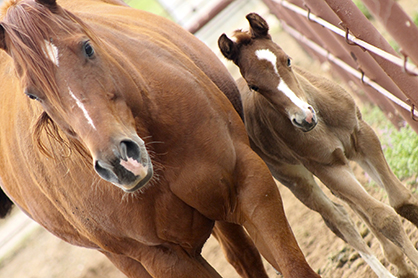Nutrition of Growing Horses- Special Considerations For the Foal
EC Blog by: Shelby Glessner
With the approaching arrival of foals this spring, it’s time to begin outlining a nutritional plan for your new additions! The following highlights some special considerations regarding young growing horses’ diets.
Young Foals
As with any animal species, the foal should receive the first milk, called colostrum, from the mare within the first 24 hours of life. Antibodies produced by the dam are passed to the foal while their digestive system is still viable before a process known as “gut closure” occurs as the foal ages even just a day. Called “passive transfer,” this absorption of antibodies is absolutely critical to give the foal a jump start at building their immune system. If the mare’s colostrum is not of appropriate quantity or quality, it is imperative that the foal is given colostrum from another mare.
Often times before weaning, a foal is allowed access to a structure called a creep feeder that the mare cannot physically access herself. During creep feeding, the foal is given grain concentrate to help transition them from milk to solid feeds, similar to how a human parent might transition their child. This can also help solve some nutritional deficiencies that might become an issue as the quality of the mare’s milk decreases in late lactation and the foal is not yet able to consume enough forage.
Growth and Nutrition
Especially in breeds predisposed to developmental orthopedic diseases, it is critical to keep the energy and nutrients provided to a young growing horse as balanced as possible. An unfortunate truth within the industry is that horses are often bred to be trained and sold as quickly as possible, and, in turn, many horse breeds are now designed to grow as large and as quickly as possible. Consuming energy-dense feeds (which encourage growth) without the proper nutrients could cause a huge variety of issues involving improper bone development. A solution may be to provide a low energy diet to your young horse to discourage this.
Similar to energy balances, it is critical to keep minerals in balance to encourage proper bone growth. Particularly important is the calcium to phosphorus ratio. It should be kept at at least 1:1, but striving to maintain a 2:1 ratio is safer! If the diet is higher in phosphorus than calcium, even if it is not actually deficient of calcium, the body may begin to pull calcium from bones to compensate for this perceived deficiency. To prevent this problem, pay close attention to the contents of forages in particular and make changes as needed to stay in the safe zone. The balance of zinc and copper, another pair of minerals often referenced in the horse industry, is generally not proven to cause issues in horses.
Finally, the protein requirement of a growing foal is much greater than that of our typical horse at maintenance! While maintenance horses generally require 10-12% protein in the diet, growing horses need closer to 14-16%. The mare’s milk will provide this while the foal is still nursing, and a grain concentrate formulated for growing horses will be a sufficient addition to meet this requirement during the transition to solid feeds and forages.
Feeding Grain
As we discuss adding grain to our young horses’ diets, it is important to remember that feed companies and their nutritionists formulate these mixes specific to the needs of the horses they are intended for. Grain already comes balanced in terms of vitamins, mineral ratios, protein content, and all other nutrients. Adding supplementations such as oil for extra fat can throw off the balance of these diets. Carefully consider any supplemental additions you make to your growing horse’s grain diet.
About
Shelby Glessner is a graduate of Michigan State University’s Animal Science program. She spent an academic year working with renowned researcher Dr. Stephanie Valberg in the Equine Neuromuscular Diagnostic Lab at MSU’s College of Veterinary Medicine and has undertaken extensive science and equine related coursework. Passionate about education, she hopes to pursue a career advocating for research-based practices in animal agriculture.











